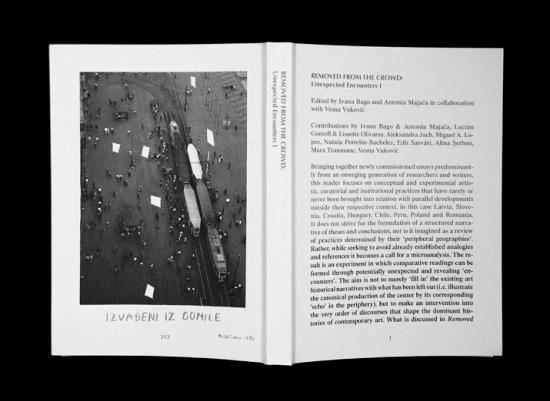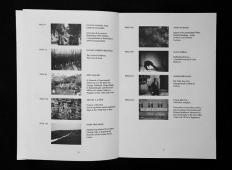REMOVED FROM THE CROWD: Unexpected Encounters I_ READER
Edited by Ivana Bago and Antonia Majača in collaboration with Vesna Vuković
With contributions by Ivana Bago & Antonia Majača, Lucian Gomoll & Lissette Olivares, Aleksandra Jach, Miguel A. López, Nataša Petrešin-Bachelez, Edit Sasvári, Alina Serban, Mara Traumane, Vesna Vuković
Bringing together newly commissioned essays predominantly from an emerging generation of researchers and writers, this reader focuses on conceptual and experimental artistic, curatorial and institutional practices that have rarely or never been brought into relation with parallels outside their respective context, in this case Latvia, Slovenia, Croatia, Hungary, Chile, Peru, Poland and Romania. It does not strive for the formulation of a structured narrative of theses and conclusions, nor is it imagined as a review of practices determined by their ‘peripheral geographies’. Rather, while seeking to avoid already established analogies and references it becomes a call for close reading. The result is an experiment in which comparative readings can be formed through potentially unexpected and revealing ‘encounters’.
The aim is not to merely ‘fill in’ the existing art historical narratives with what has been left out (i.e. illustrate the canonical production of the center by its corresponding ‘echo’ in the periphery), but to make an intervention into the very order of discourses that shape the dominant histories of contemporary art. What is discussed in Removed from the Crowd: Unexpected Encounters I are exactly those practices that were themselves in search of new methodologies, exploring the interstices between the collective and individual, private and public, action and escapism, art and non-art, artist and curator, urban and nature, visible and invisible. Many of them were taking place in private spaces, in solitude, in nature, or camouflaging themselves as non-art, as part of everyday life, a protest, a crowded street, radically redefining or ignoring the idea of audience. They rather counted (consciously or not) on ‘an audience to come’ and so could be said to have been meant for the future. The art historians invited to contribute are thus today their ‘delayed public’, approaching them from both historical and contemporaneous perspectives, shaped by their own preoccupations and urgencies.




